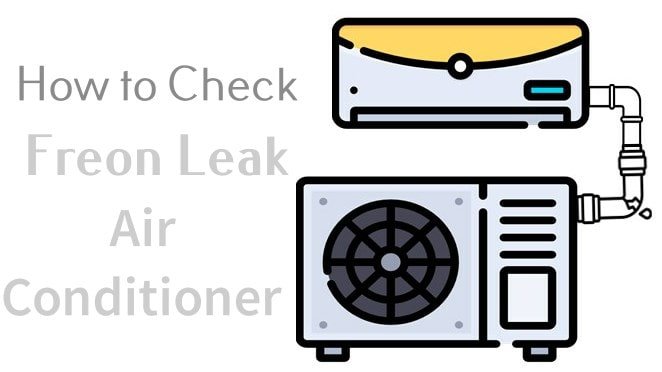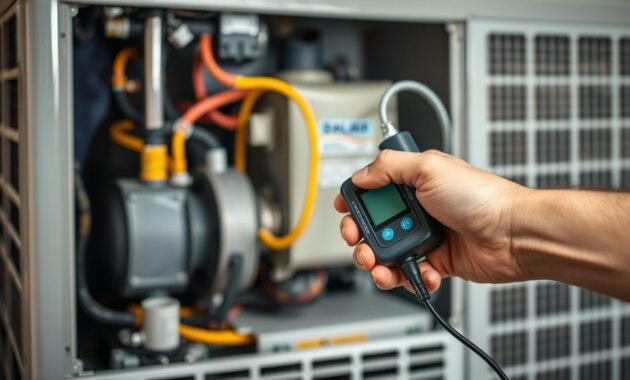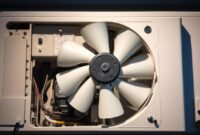As a homeowner, knowing how to find Freon leaks in your AC can save you money. It also helps prevent damage to your system. Air conditioning problems can be hard to spot, but with the right tips, you can catch issues early.
Freon is key to keeping your home cool. If there’s a leak, your AC won’t work right. I’ll share some important ways to find refrigerant leaks and keep your cooling system in top shape.
Spotting a Freon leak early can help fix problems fast. Look out for odd cooling, strange sounds, or higher energy bills. These signs might mean you have a refrigerant problem that needs fixing right away.

This guide will show you how to find Freon leaks effectively. Your home will stay cool, and your AC will work well. These tips are great for DIY fans or anyone who wants to be ready before calling a pro.
Understanding Freon and Its Role in Air Conditioning Systems
Air conditioning systems use a complex heat transfer process. It might seem mysterious to many homeowners. I’ll explain how refrigerants like Freon keep your home cool and comfortable.
Read also: Does Freon Leak When AC is Off?
What is Freon and Why It Matters
Freon is a special chemical that absorbs heat from inside your home. It moves this heat outside through refrigerant lines. This lets your air conditioning system cool your home down.
The refrigerant goes through your AC unit, changing from liquid to gas and back. This process removes heat and humidity from your space.
- Absorbs heat from indoor air
- Transfers heat through refrigerant lines
- Enables efficient cooling process
The Environmental Impact of Freon
Freon was once common, but now it’s a concern for the environment. The U.S. is phasing out traditional Freon (R-22) because it harms the ozone layer. Now, we’re moving to greener alternatives that cool just as well but are better for the planet.
Transition to Modern Refrigerants
Today’s air conditioning systems use refrigerants like R-410A. These new options are better for the environment. They absorb heat without harming our planet as much. Knowing about this change helps you make smart choices for your AC system.
Common Signs of a Refrigerant Leak in Your AC Unit
Finding a freon leak early can save you money and keep your AC working well. As a homeowner, it’s important to know the signs. This helps keep your AC running right and avoids damage.
Leaks can show up in different ways. Here are the main signs that your AC might have a refrigerant problem.
- Weak Airflow: Reduced air strength from vents indicates refrigerant problems
- Warm Air Circulation: Cool air turns warm when refrigerant levels fall
- Extended Cooling Cycles: Your AC works harder and longer to cool
- Unexpected Ice Buildup: Frozen evaporator coils mean possible refrigerant leakage
Listen for odd sounds around your AC. Hissing or bubbling noises can mean a freon leak. These sounds often happen near connections or lines where leaks might occur.
| Symptom | Potential Indication |
|---|---|
| Rising Utility Bills | Inefficient AC performance due to low refrigerant |
| Persistent Humidity | Reduced cooling capacity from refrigerant loss |
| Ice on Refrigerant Lines | Clear sign of significant refrigerant leakage |
By watching for these signs, you can spot refrigerant leaks early. Catching them quickly helps avoid bigger problems. It also keeps your AC running efficiently.
Essential Tools Needed for Detecting Freon Leaks
Want to find out if your home AC system has a freon leak? The right tools are key. You’ll need both basic and professional gear to spot leaks safely and right.
Read also: How to Check the Freon in a Home Air Conditioner
Choosing the right tools is the first step in finding freon leaks. Let’s look at the must-haves for a detailed check.
Basic Detection Equipment
- UV Dye Kit: A cost-effective way to spot refrigerant leaks
- Soap Solution: Creates bubbles to show small leak spots
- Flashlight: Illuminates dark spots during the check
- Magnifying Glass: For a close look at small parts
Professional-Grade Testing Tools
- Electronic Leak Detector: Finds refrigerant leaks with precision
- Manifold Gauge Set: Checks system pressure and finds leaks
- Infrared Thermal Camera: Sees temperature changes that mean leaks
- Refrigerant Leak Detector Probe: Finds exact leak spots
Safety Equipment Requirements
- Protective Gloves: Keep hands away from refrigerant
- Safety Goggles: Protect eyes from chemical splashes
- Respirator Mask: Keeps you safe from harmful fumes
- Long-sleeved Clothing: Covers skin during the check
While basic tools can help find freon leaks, complex problems need a pro. Always put safety first when checking your AC system.
How to Check for Freon Leak in Home AC

Finding a Freon leak in your home AC needs careful steps and the right tools. I’ll show you the best ways to find and fix refrigerant leaks. These leaks can hurt your AC’s performance.
Learning to spot Freon leaks in your home AC involves several steps. It’s a tough task, but knowing what to look for can help. This way, you can catch problems early.
- Visual Inspection: Look for oil stains or frost buildup around AC connections
- Listen for hissing sounds near refrigerant lines
- Check for reduced cooling performance
- Monitor unusual ice formation on the evaporator coil
To find Freon leaks in your home AC, try three main methods:
- Soapy Water Method: Apply soap solution to suspect connections
- Electronic Leak Detector: Use professional-grade detection equipment
- Professional HVAC Inspection: Most reliable for thorough leak detection
DIY methods can help find leaks, but handling refrigerant is tricky. Certified HVAC technicians have the skills to safely find and fix Freon leaks. They make sure your system works well and safely.
Remember, refrigerant leaks can really affect your AC’s performance and energy use. Finding and fixing leaks quickly is key to keeping your home cool.
Using Soapy Water Method to Detect Leaks
Want to find out how to check for freon leaks in your AC system? The soapy water method is a simple and effective way. It’s a DIY solution that doesn’t require expensive tools. Let’s go through it step by step.
Preparing the Soap Solution
Creating the right soap solution is key for leak detection. Here’s what you’ll need:
- Mild dish soap
- Lukewarm water
- Clean spray bottle
Mixing and Application Techniques
To make the solution, mix about 0.5 teaspoons of dish soap with lukewarm water in your spray bottle. Shake it gently to mix well.
Detecting Leaks with Bubble Formation
For finding freon leaks, spray the soap solution on refrigerant line joints and connections. Look for bubble formation:
| Bubble Type | Leak Indication |
|---|---|
| Large, growing bubbles | Significant refrigerant leak |
| Small, foamy bubbles | Likely no substantial leak |
While this method can spot leaks, it’s not 100% reliable. For a thorough check, it’s best to get an HVAC expert.
Electronic Leak Detector Method
Electronic leak detectors are great for finding leaks in your AC system. They are precise tools that help both homeowners and HVAC experts find refrigerant escapes accurately.
These detectors use a special sensing mechanism. They have a probe that can find tiny amounts of refrigerant in the air. To use it well, you need to follow a few steps:
- Power on the electronic leak detector
- Calibrate the device according to manufacturer instructions
- Move the probe slowly along refrigerant lines and connections
- Listen for distinct beeping sounds or watch for LED indicators
The detector’s sensitivity lets you spot leaks that are hard to see. Top models can find leaks as small as 0.1 ounces per year. When checking your AC unit, focus on:
- Refrigerant line connections
- Valve joints
- Evaporator coils
- Compressor areas
Even though electronic leak detectors are very useful, they have some limits. Some models might not work with all refrigerants or in certain conditions. If you’re dealing with a tricky leak, it’s best to get help from an HVAC expert.
Locating and Inspecting Refrigerant Lines
Looking for leaks in your air conditioning system starts with checking the refrigerant lines. These parts can get weak and hurt your AC’s work. I’ll show you how to check both indoor and outdoor units to find the leak.
Indoor Unit Inspection Techniques
When you look at the indoor unit, watch for these important spots:
- Check the evaporator coil for any signs of frost or ice buildup
- Inspect the line set where refrigerant lines enter your home
- Look for oil residue or discoloration around connections
- Examine pipe insulation for damage or deterioration
Outdoor Unit Examination
The outdoor unit needs a close look to find refrigerant line problems. Focus on these key points:
- Examine the filter/dryer tube in the bottom right corner of the condenser box
- Check condenser coils for visible damage or corrosion
- Inspect valve connections for signs of wear
- Look for any oily residue around refrigerant line connections
Finding leaks in refrigerant lines can be tough. A visual check helps, but it might miss some leaks. Some leaks need special tools or a pro to find.
If you see odd signs like oil stains, frost, or strange noises, get an HVAC expert. They can find leaks and stop damage to your system.
Professional vs DIY Leak Detection
Homeowners often wonder if they should try to find AC freon leaks themselves or call a pro. While you can do some checks at home, hiring a professional HVAC tech has many benefits.
DIY leak detection has its downsides. Without the right tools and knowledge, you might not find refrigerant problems accurately. Professionals have the skills and tools to do a thorough job:
- Advanced diagnostic tools
- Comprehensive system evaluation
- Legal compliance with environmental regulations
- Precise leak location identification
For complex freon leak detection, I suggest getting professional help. Your AC system is a big investment. Handling it wrong can cause expensive damage.
| DIY Method | Professional Inspection |
|---|---|
| Limited accuracy | Precise diagnostic capabilities |
| Basic leak detection tools | Advanced electronic leak detectors |
| Potential safety risks | Certified technician expertise |
| No environmental certification | Compliant with EPA regulations |
If you’re curious about checking your AC freon level, start with simple checks. Look for ice on lines or listen for odd sounds. If you think there’s a big leak, call a pro HVAC tech. They can safely and accurately find the problem.
Safety Precautions When Checking for Freon Leaks
When you’re checking for freon leaks in your home’s AC, safety comes first. Freon can be harmful if not handled right. So, it’s key to protect yourself during any checks.
Before you start looking for freon leaks, make sure to follow these important safety tips:
- Wear protective personal equipment (PPE), including:
- Chemical-resistant gloves
- Safety glasses or goggles
- Long-sleeved clothing
- Ensure proper ventilation in the work area
- Keep children and pets away from the AC unit
- Never attempt to repair refrigerant leaks without professional certification
When you’re checking for freon leaks in your home’s AC, knowing the risks is key. Freon can cause serious health problems, like breathing issues and skin irritation. If you smell a strong chemical or notice any odd symptoms, stop right away and open up the area.
Professional HVAC technicians know how to handle refrigerant safely. If you’re not sure about anything, it’s best to call a certified pro. They can do a full check without putting your health at risk.
Remember, your safety is more important than trying to fix freon leaks yourself in your home’s AC system.
What to Do After Finding a Leak
Discovering a Freon leak in your home AC system can be stressful. Knowing the right steps to take can protect your cooling system and prevent damage. When you’ve identified how to check for freon leak, quick and careful action is key.

Once you’ve detected a refrigerant leak, your first priority is preventing further system damage. The system absorbs heat less efficiently when refrigerant levels drop. This can strain your entire cooling mechanism.
Immediate Actions to Take
- Turn off your air conditioning system completely
- Do not attempt to recharge the system yourself
- Avoid running the AC until professional repair
- Ventilate the area if you suspect significant leakage
Contacting HVAC Professionals
Select a reputable HVAC technician who can diagnose and repair the leak professionally. Look for certified professionals with experience in refrigerant leak detection and repair.
| Technician Qualification | Importance |
|---|---|
| EPA Certification | Ensures proper handling of refrigerants |
| HVAC License | Confirms professional training |
| Insurance Coverage | Protects against possible damages |
Documentation Steps
- Take clear photographs of the leak location
- Record the date of detection
- Keep all repair and service receipts
- Note any system performance changes
Remember, Freon doesn’t get “used up” – low levels always indicate a leak. Professional repair is essential to maintain your AC system’s efficiency and prevent further complications.
Conclusion
Checking for Freon leaks in your home AC system is easier than you think. I’ve shown you several ways to spot refrigerant issues early. Knowing how to check for Freon leaks can save you money and prevent damage to your AC.
Prevention is key. Regular maintenance and quick leak detection keep your AC running well. We talked about using soapy water and electronic detectors to find leaks. While DIY methods are useful, knowing when to call a pro is also important for full system care.
As technology and rules change, keeping up with your AC’s performance is vital. Modern AC systems are more energy-efficient and eco-friendly. When it’s time to replace your unit, look into newer, greener refrigerants. Being proactive about Freon leaks helps protect your investment and the environment.
Your home’s comfort and safety rely on a well-kept AC system. Take the time to learn about your AC, do regular checks, and get professional help when needed.


